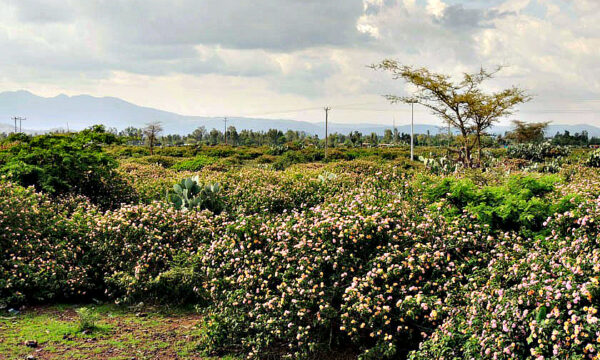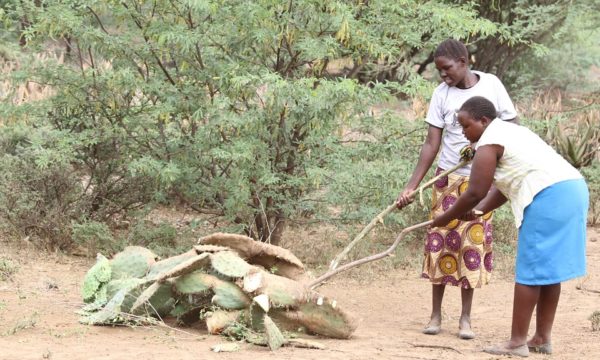
Prosopis juliflora is considered one of the world’s most threatening non-native tree species. Though it was introduced to Eastern Africa in the 1970s to provide wood and fodder and reduce erosion on degraded land, it has since spread rapidly with a range of severe impacts.
In this blog, the second of a two-part series, we look at how greater awareness and bottom-up approach to tackling woody weeds is leading communities to take action to reduce impacts in worst affected areas of Tanzania’s Lake Natron Basin.
As part of a project, co-led by CABI and the Tanzania Forestry Research Institute (TAFORI), a focus has been on raising awareness about the starting invasion by Prosopis among many stakeholders in the Lake Natron Basin and the project has supported co-development of a management plan for this species.
Effects of the invasion on the environment and livelihoods
An influential intervention was a visit by members of the Local Implementation Group to an area heavily invaded by Prosopis, where participants saw and heard about the effects of the invasion on the environment and livelihoods.
Earlier this year, project partners also participated in a meeting with District administrators to inform them and promote inclusion of Prosopis management in District annual plans.
Recently, a separate event with Local and International NGOs active in the region was held to raise awareness also among them and to make sure activities can be coordinated.
Finally, management of Prosopis by members of two communities around Lake Natron has resulted in removal of the trees on more than 20ha of communal land.

The project provided training on the use of tree poppers and herbicide for Prosopis removal, and tools were provided to enable community members to engage in management activities.

The people were motivated to participate in management actions because of project awareness raising and the strong engagement of two champions in Longido and Ngorongoro Districts.
A range of donors and partners
The work is funded by the Darwin Initiative which is aimed at tackling the scourge of woody weeds that threatens biodiversity and livelihoods in Tanzania.
It is being co-led by CABI and the Tanzania Forestry Research Institute (TAFORI) in partnership with the Tanzania Natural Resource Forum (TNRF), Community Research and Development Services (CORDS), the Tanzania Wildlife Management Authority (TAWA) and the Centre for Development and Environment of the University of Bern (CDE). The project builds on experience and expertise gained through the Woody Weeds and Woody Weeds + projects.
Dr Rene Eschen, Research Scientist, Ecosystems Management, and Risk Analysis and Invasion Ecology based at CABI’s Swiss Centre in Delémont, said, “Prosopis is a fast-growing evergreen species which flourishes even in arid environments and its pods are eaten by animals and people.
“An invasion of prosopis transforms grassy ecosystems to dry shrubland and changes livelihoods from livestock to wood-based activities which do not in themselves contribute to food security.
“However, the creation of a Local Implementation Group has enabled the chance to reflect on the issue of biological invasions and their impacts on livelihoods and nature.”
Management options in the landscape
Dr Eschen said the communities affected have helped to identify management options in the landscape and have been involved in the designing of surveillance and management measures to tackle woody weeds of concern.
A management plan has been developed and presented to the Regional Administrative Secretary and Vice-President’s Office and it is hoped that this will be adopted by Regions and Districts in due course.
The plan includes training people to demonstrate management techniques to remove Prosopis juliflora, assess changes in stakeholder knowledge and perception of the problem as well as detailed mapping of where the weed is and where it is likely to spread.
Dr Eschen said, “The work in the Lake Natron Basin is a classic example of a successful Integrated Landscape Management project that engages communities to be active in the solution to a problem which ultimately benefits their livelihoods.
“We recommend further awareness raising about ILM practices and their benefit as well as the upscaling of these practices to other areas affected by prosopis.”
District Commissioner of Monduli District, Hon. Joshua Nassari, addressed a workshop in June 2023, which provided an opportunity for members of a Regional Task Force to present their opinions on controlling Prosopis juliflora to the Office of the Vice President.
He said, “The implementation of the National Invasive Species Strategy and Action Plan will be achieved by strengthening coordination among actors at various levels of decision making,” he said. “This involves them preparing a strategy to control prosopis together, establishing a suitable monitoring system for invasive plants and implementing coordinated joint management.”
Additional information
Main image: Supporting implementation of strategy and action plan to tackle woody weeds in Tanzania’s Lake Natron Basin (Credit: CABI).
Project pages
Find out more about the Darwin Initiative project ‘Coordinated invasive plant management to protect Tanzanian biodiversity and livelihoods’ here.
Discover how CABI is helping to tackle prosopis at the Woody Weeds + website and the project page ‘Woody weeds in East Africa.’
Relevant paper
See also the CABI-led paper ‘Towards estimating the economic cost of invasive alien species to African crop and livestock production,’ published in the CABI Agriculture and Bioscience journal.
First blog in the series
See also the first blog in the series ‘Facilitating strategy and action plans to address woody weeds in Tanzania’s Lake Natron Basin.’
Relevant stories
‘Research reveals invasive Lantana camara reduced growth of maize by 29% in East Usambara, Tanzania’
Related News & Blogs
New CABI book explores the ecology and management of invasive Prosopis trees in Eastern Africa
CABI has published a new book which explores the ecology and management of invasive Prosopis juliflora trees which have severely impacted landscapes and the livelihoods of pastoral communities in Eastern Africa. The 272-page book, entitled ‘The Ecology…
20 January 2025




